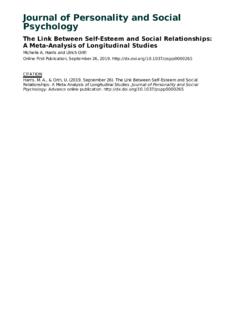Transcription of The Importance of Relationships in Social Work
1 The Importance of Relationships in Social Work Jim Kennedy Special Report March 2019. Careknowledge Pavilion Publishing and Media Ltd Rayford House, School Road, Hove, Sussex BN3 5HX. Tel : 01273 434943. E: @CareKnowledge : CareKnowledge Copyright Pavilion Publishing and Media 2019. All rights reserved. No part of this publication may be reproduced, stored in a retrieval system, or transmitted in any form or by any means, electronic, mechanical, photocopying, recording or otherwise, without the prior permission in writing of the publisher. 2. 1. Introduction This Special Report has been pulled together to mark this year's World Social Work Day on the 19th of March, which focuses on promoting the Importance of human Relationships .
2 The Report draws attention to some of the key content to which we provide access, that has something important to say on the subject of Relationships . Although some of the publications in the report are applicable specifically to England, the bulk of the issues discussed, and the material available, have relevance across the UK and, in some cases internationally. Social work is arguably, to a much greater extent than many other professions, founded on a belief in the value of human Relationships . It is also a profession which is highly dependent, for its impact, on the establishment and maintenance of effective Relationships with the children and adults whom it supports, with their families and communities, and with fellow professionals and the agencies for whom they work.
3 If those Relationships are not well-established, or sustained, or if they fail, the consequences can be serious, and, at the extreme, fatal, for some of the most vulnerable people in society. Of course, individual Social workers are not solely responsible for the maintenance of that full web of Relationships , and managers, employers and the agencies with whom Social workers are engaged must play a full part in creating the conditions in which positive Relationships can flourish. But there remains a core responsibility, on individual practitioners, to maximise the opportunities that are available to support effective Relationships ; and to seek wider solutions if those are less available than they should be, or, are absent.
4 with that introduction in mind, it is perhaps slightly disappointing that the centrality of Relationships to the practice of Social work has not been given quite the prominence in recent years as may have been the case in the past. Although a wide range of publications some of which are highlighted later in this report are available, through CareKnowledge, that, in part, address the subject, there are fewer that can be said to centre wholeheartedly or, in full detail, on Relationships . We were also a little surprised to note that the definition of Social work promulgated by the International Federation of Social Workers (IFSW), the main sponsors of World Social Work Day has been changed fairly recently.
5 The previous definition is still referred to by a number of organisations and features in several of the reports highlighted below. The original definition ran as follows: The Social work profession promotes Social change, problem solving in human Relationships and the empowerment and liberation of people to enhance well-being. Utilising theories of human behaviour and Social systems, Social work intervenes at the points where people interact with their environments. Principles of human rights and Social justice are fundamental to Social work.. The new definition approved by the IFSW General Meeting and the International Association of Schools of Social Work (IASSW) General Assembly in July 2014. drops the specific reference to Relationships : Social work is a practice-based profession and an academic discipline that promotes Social change and development, Social cohesion, and the empowerment and liberation of people.
6 Principles of Social justice, human rights, collective responsibility and respect for diversities are central to Social work. Underpinned by theories of Social work, Social sciences, humanities and indigenous knowledge, Social work engages people and structures to address life challenges and enhance wellbeing. The above definition may be amplified at national and/or regional levels.. There are good reasons for the change in definition, discussed on the IFSW website, but the omission of reference to Relationships jars a little with the chosen focus for World Social Work Day. The current BASW definition set out in this House of Commons Briefing also makes no specific reference to the Importance of Relationships : Social work is a profession that is centred around people from babies through to older people.
7 Social workers work with individuals and families to help improve outcomes in their lives. This may be helping to protect vulnerable people from harm or abuse or supporting people to live independently. Social workers support people, act as advocates and direct people to the services they may require. Social workers often work in multi-disciplinary teams alongside health and education professionals.. Whilst all of the above may confirm something of an absence of an on-the-label'. focus on the Importance of Relationships in Social work, there are a significant number of publications, available, through CareKnowledge that do address the issue in their more detailed material. In what follows, we've selected a number of those publications and, in some cases, highlighted content that speaks to the Importance of Relationships with people who use services and their families and communities.
8 with colleagues including supervisors and managers; and with and between agencies. 2. Standards BASW's refreshed Professional Capabilities Framework for Social Work in England includes these key expectations for qualified Social workers. They must: Acknowledge the centrality of Relationships for people and the key concepts of attachment, separation, loss, change and resilience Demonstrate the ability to engage with people, and build, manage, sustain and conclude compassionate and effective Relationships Identify and understand the impact of the power invested in the SW role on Relationships and interventions, and have the ability to adapt practice accordingly Build and use effective Relationships with a wide range of people, networks, communities and professionals to improve outcomes, showing an ability to use appropriate assessment frameworks, applying information gathering skills to make and contribute to assessments.
9 Whilst continuing to build Relationships and offer support Work effectively as a member of a team, demonstrating the ability to develop and maintain appropriate professional and inter-professional Relationships , managing challenge and conflict, with support Promote a culture which supports empathetic compassionate Relationships with other professionals, people who use services, and those who care for them Promote positive working Relationships in and across teams, using strategies for collaboration and contribute to a supportive organisational culture Develop strategic engagement, influence and Relationships with a range of stakeholder groups The Knowledge and Skills Statements for Child and Family Social Workers The Statements, now with titles establishing them as post-qualifying standards under Section 42 of the Children and Social Work Act 2017, cover child and family practitioners, their supervisors and practice leaders.
10 Published by the Department for Education (DfE) and applicable in England they say that Social workers must: Build effective Relationships with children, young people and families, which form the bedrock of all support and child protection responses. Be both authoritative and empathic and work in partnership with children, families and professionals, enabling full participation in assessment, planning, review and decision making Help children to separate from, and sustain, multiple Relationships recognising the impact of loss and change Observe and talk to children in their environment including at home, at school, with parents, carers, friends and peers to help understand the physical and emotional world in which the child lives, including the quality of child and parent/carer interaction and other key Relationships Reflect on the emotional experience of working Relationships with parents, carers and children.





